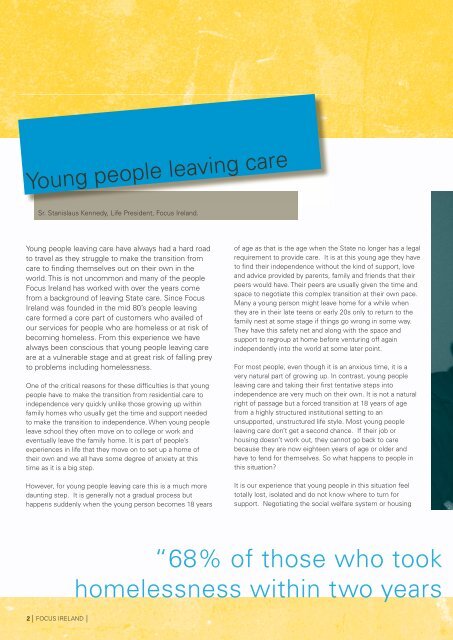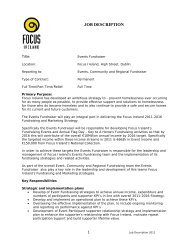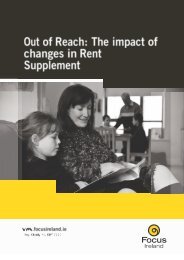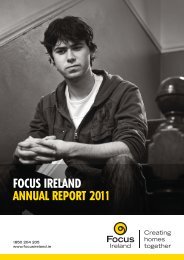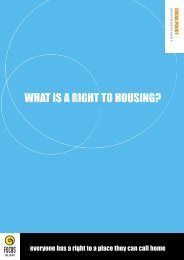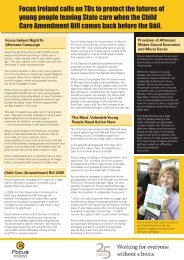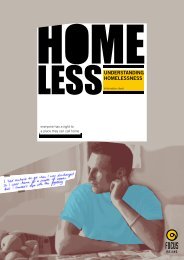Bridging the gap: from care to home - Focus Ireland
Bridging the gap: from care to home - Focus Ireland
Bridging the gap: from care to home - Focus Ireland
Create successful ePaper yourself
Turn your PDF publications into a flip-book with our unique Google optimized e-Paper software.
Young people leaving <strong>care</strong><br />
Sr. Stanislaus Kennedy, Life President, <strong>Focus</strong> <strong>Ireland</strong>.<br />
Young people leaving <strong>care</strong> have always had a hard road<br />
<strong>to</strong> travel as <strong>the</strong>y struggle <strong>to</strong> make <strong>the</strong> transition <strong>from</strong><br />
<strong>care</strong> <strong>to</strong> finding <strong>the</strong>mselves out on <strong>the</strong>ir own in <strong>the</strong><br />
world. This is not uncommon and many of <strong>the</strong> people<br />
<strong>Focus</strong> <strong>Ireland</strong> has worked with over <strong>the</strong> years come<br />
<strong>from</strong> a background of leaving State <strong>care</strong>. Since <strong>Focus</strong><br />
<strong>Ireland</strong> was founded in <strong>the</strong> mid 80’s people leaving<br />
<strong>care</strong> formed a core part of cus<strong>to</strong>mers who availed of<br />
our services for people who are <strong>home</strong>less or at risk of<br />
becoming <strong>home</strong>less. From this experience we have<br />
always been conscious that young people leaving <strong>care</strong><br />
are at a vulnerable stage and at great risk of falling prey<br />
<strong>to</strong> problems including <strong>home</strong>lessness.<br />
One of <strong>the</strong> critical reasons for <strong>the</strong>se difficulties is that young<br />
people have <strong>to</strong> make <strong>the</strong> transition <strong>from</strong> residential <strong>care</strong> <strong>to</strong><br />
independence very quickly unlike those growing up within<br />
family <strong>home</strong>s who usually get <strong>the</strong> time and support needed<br />
<strong>to</strong> make <strong>the</strong> transition <strong>to</strong> independence. When young people<br />
leave school <strong>the</strong>y often move on <strong>to</strong> college or work and<br />
eventually leave <strong>the</strong> family <strong>home</strong>. It is part of people’s<br />
experiences in life that <strong>the</strong>y move on <strong>to</strong> set up a <strong>home</strong> of<br />
<strong>the</strong>ir own and we all have some degree of anxiety at this<br />
time as it is a big step.<br />
However, for young people leaving <strong>care</strong> this is a much more<br />
daunting step. It is generally not a gradual process but<br />
happens suddenly when <strong>the</strong> young person becomes 18 years<br />
of age as that is <strong>the</strong> age when <strong>the</strong> State no longer has a legal<br />
requirement <strong>to</strong> provide <strong>care</strong>. It is at this young age <strong>the</strong>y have<br />
<strong>to</strong> find <strong>the</strong>ir independence without <strong>the</strong> kind of support, love<br />
and advice provided by parents, family and friends that <strong>the</strong>ir<br />
peers would have. Their peers are usually given <strong>the</strong> time and<br />
space <strong>to</strong> negotiate this complex transition at <strong>the</strong>ir own pace.<br />
Many a young person might leave <strong>home</strong> for a while when<br />
<strong>the</strong>y are in <strong>the</strong>ir late teens or early 20s only <strong>to</strong> return <strong>to</strong> <strong>the</strong><br />
family nest at some stage if things go wrong in some way.<br />
They have this safety net and along with <strong>the</strong> space and<br />
support <strong>to</strong> regroup at <strong>home</strong> before venturing off again<br />
independently in<strong>to</strong> <strong>the</strong> world at some later point.<br />
For most people, even though it is an anxious time, it is a<br />
very natural part of growing up. In contrast, young people<br />
leaving <strong>care</strong> and taking <strong>the</strong>ir first tentative steps in<strong>to</strong><br />
independence are very much on <strong>the</strong>ir own. It is not a natural<br />
right of passage but a forced transition at 18 years of age<br />
<strong>from</strong> a highly structured institutional setting <strong>to</strong> an<br />
unsupported, unstructured life style. Most young people<br />
leaving <strong>care</strong> don’t get a second chance. If <strong>the</strong>ir job or<br />
housing doesn’t work out, <strong>the</strong>y cannot go back <strong>to</strong> <strong>care</strong><br />
because <strong>the</strong>y are now eighteen years of age or older and<br />
have <strong>to</strong> fend for <strong>the</strong>mselves. So what happens <strong>to</strong> people in<br />
this situation?<br />
It is our experience that young people in this situation feel<br />
<strong>to</strong>tally lost, isolated and do not know where <strong>to</strong> turn for<br />
support. Negotiating <strong>the</strong> social welfare system or housing<br />
2 | FOCUS IRELAND |<br />
“68% of those who <strong>to</strong>ok<br />
<strong>home</strong>lessness within two years


